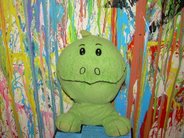Autism is something I have always been interested in. When I was younger, I remember I would always get Autism mixed up with Down syndrome. I don’t particularly know why I did this; I just associated the two as being the same thing. After a while, I grew tired of not knowing the difference between the two very different disorders and decided to research them. I realized that Down syndrome was a disorder caused by a deformation of the 21st chromosome, which causes mental and physical disabilities. It is a definable and clear disorder.
 Autism, I found, was completely different. Autism has been an unanswered question since 1912, baffling and astounding doctors, scientists, and parents. Every case of autism is different with no set standard of cause or symptoms. Autism is like a two-way mirror; a child is in a room by himself, looking at a clouded mirror, unaware that we are on the other side of that mirror looking in at him and trying our best to breakthrough; to let him know we are there.
Autism, I found, was completely different. Autism has been an unanswered question since 1912, baffling and astounding doctors, scientists, and parents. Every case of autism is different with no set standard of cause or symptoms. Autism is like a two-way mirror; a child is in a room by himself, looking at a clouded mirror, unaware that we are on the other side of that mirror looking in at him and trying our best to breakthrough; to let him know we are there.From the first time I looked up this disorder it fascinated me. It stayed at the back of my mind up until it was discovered that a cousin of mine, Noah, had been diagnosed with autism. I recalled the few babysitting sessions we had had together and found the characteristics of autism there right in front of me. I was never, however, given the opportunity to work with Noah due to family problems. Since then, autism has been the source of a furious thirst, something that I can not seem to quench. When the topic of a research paper was brought up, this was obviously the first thing that came to mind. My previous encounters with fascinating research
sparked my curiosity and my drive to further my knowledge on a subject that has always been at the back of my mind.

The focus for the paper will be on a new theory surrounding the cause of autism; a disruption in mirror neurons. There is still a lot of research to be done in the area, but what has been done so far is astounding. Mirror neurons are being haled by some scientists as the most important discovery of the decade, and by others as an over hyped theory. I'm anxious to begin looking further into the truth about mirror neurons.
The image is of the location of the mirror neuron system in humans from Wikipedia.com.




3 comments:
This topic sounds interesting. Have you ever seen the advertisement on TV for autism that says the statistics? I have never learned much about autism, but that commercial will defiantly influence myself and many people to become more interested. I can honestly admit that I don't know the many differences between the effects of autism and down syndrome either. It will be interesting to find out. Autism doesn't affect physical characteristics does it?
Autism has always been a sort of mystery to me. Thanks for sheding some light on the subject. I've interacted with autistic persons before and I felt very sorry for them, because their disease is very apparent. Although my experience on the subject consists of only a few encounters my opinion is that these people have medical cases that need to be treated just like any other disease. Although there is no cure I believe that it is not impossible to find one. I'd like to here more on the mechanism and maybe even experimental treatments. Medical science is getting extremely advance. My medical knowledge falls just short of the TV show "Scrubs". Nice Work!
Autism has always been a confusing subject for me. As far as I know it also has been very confusing for doctors and those researching it and it seems as though not very much has been scientifically found out about it. Anything that I have come to read or hear about autism does not seem to be very clear. It appears that doctors and researchers don't really know that much about the disease, or why it occurs. The way the symptoms have been described to me, it seems very hard to diagnose someone with this disease. Maybe you could talk about this, maybe make it more clear for those who don’t really understand it. I think that it will become a great topic for you, and the burning to understand that you have will surely help you to answer some of the questions in the field. It might really help you to use an interview with your cousin, if possible. While studying the topic, and also studying your cousin, who knows what you will come up with. Since you may even be able to learn about this through live contact with someone who has the disorder you could even come to some kind of breakthrough. I wish you luck with this topic, although it seems as though you won't need any because your yearning to understand autism will lead to a great paper.
Post a Comment